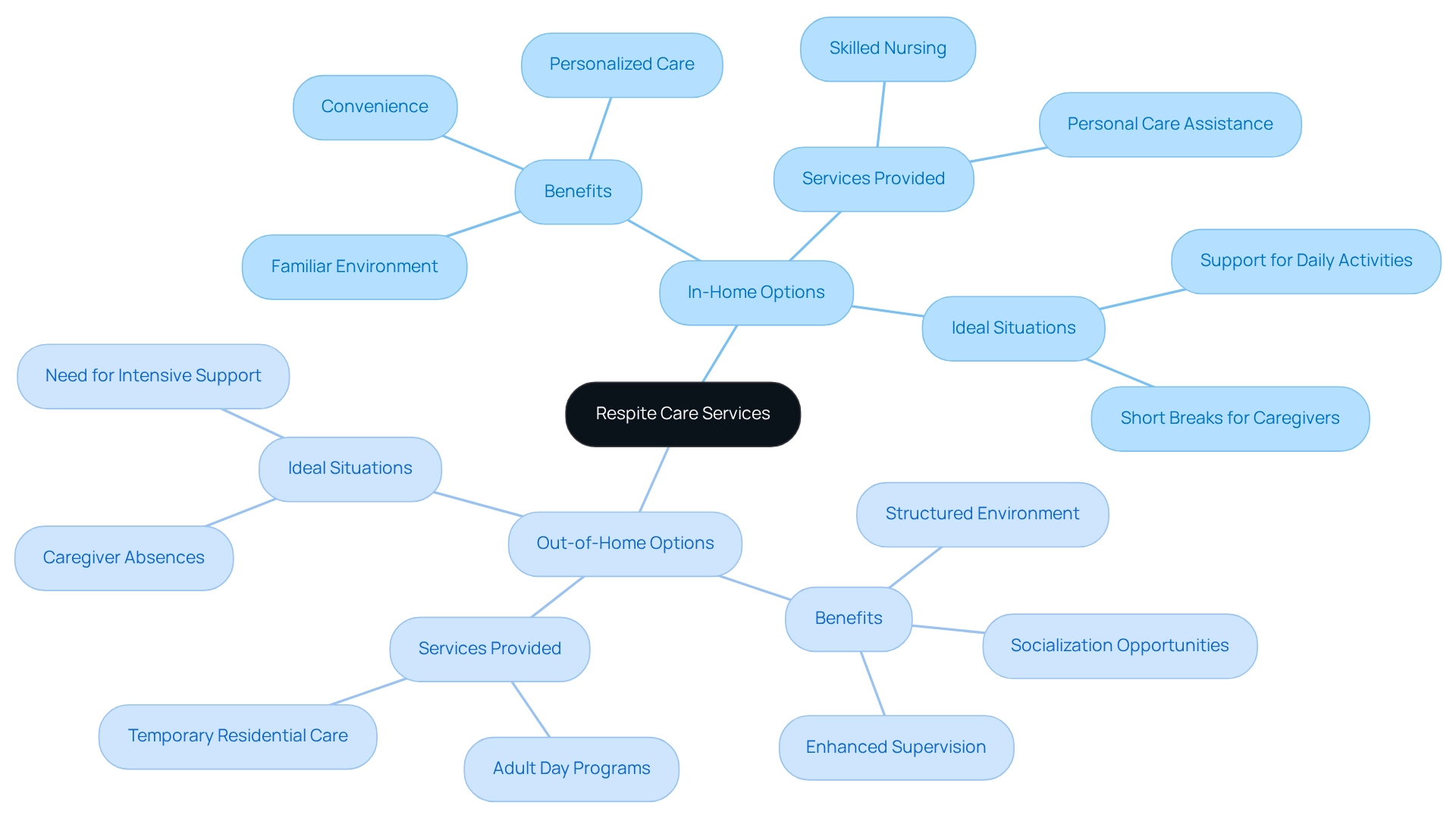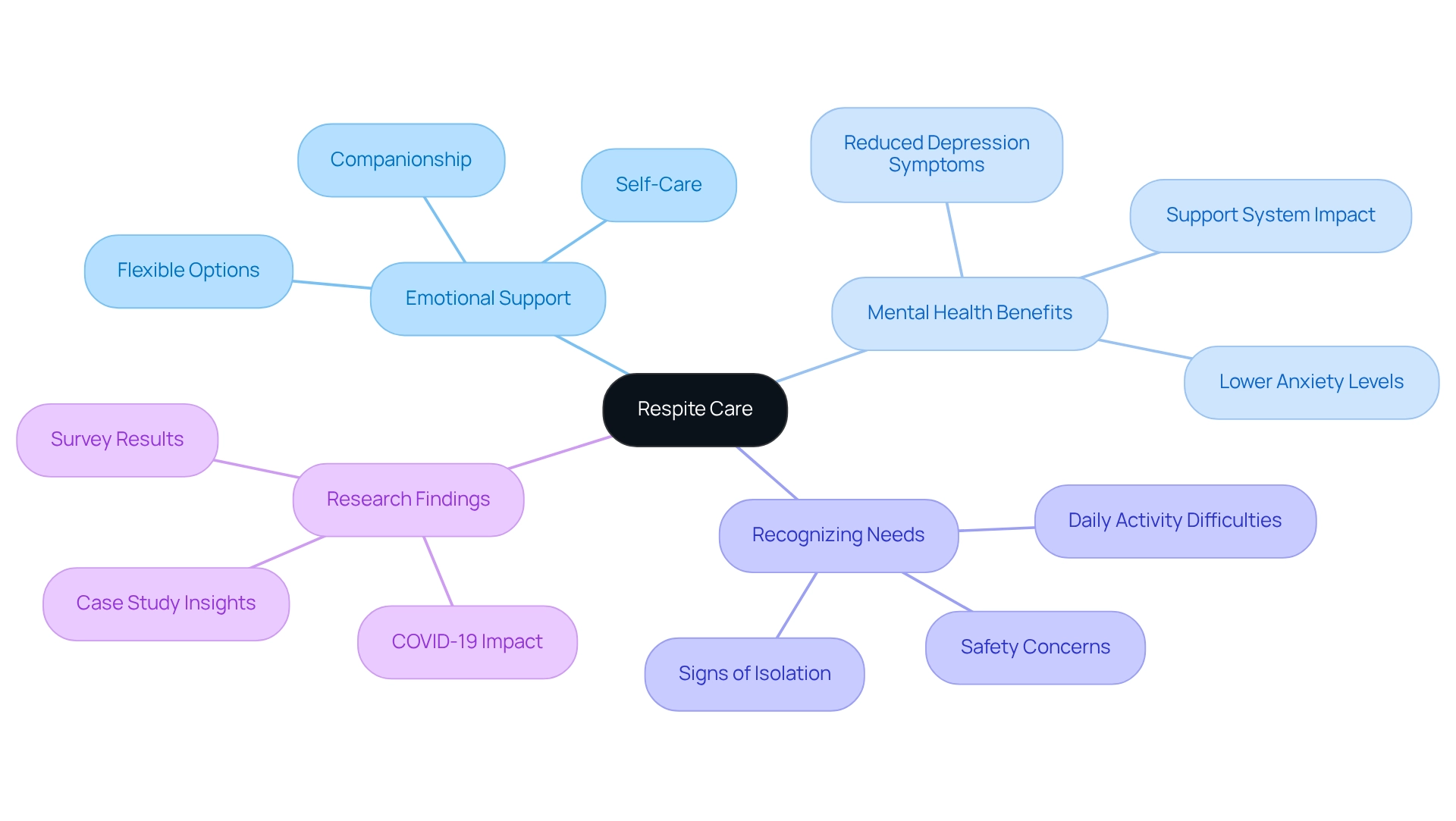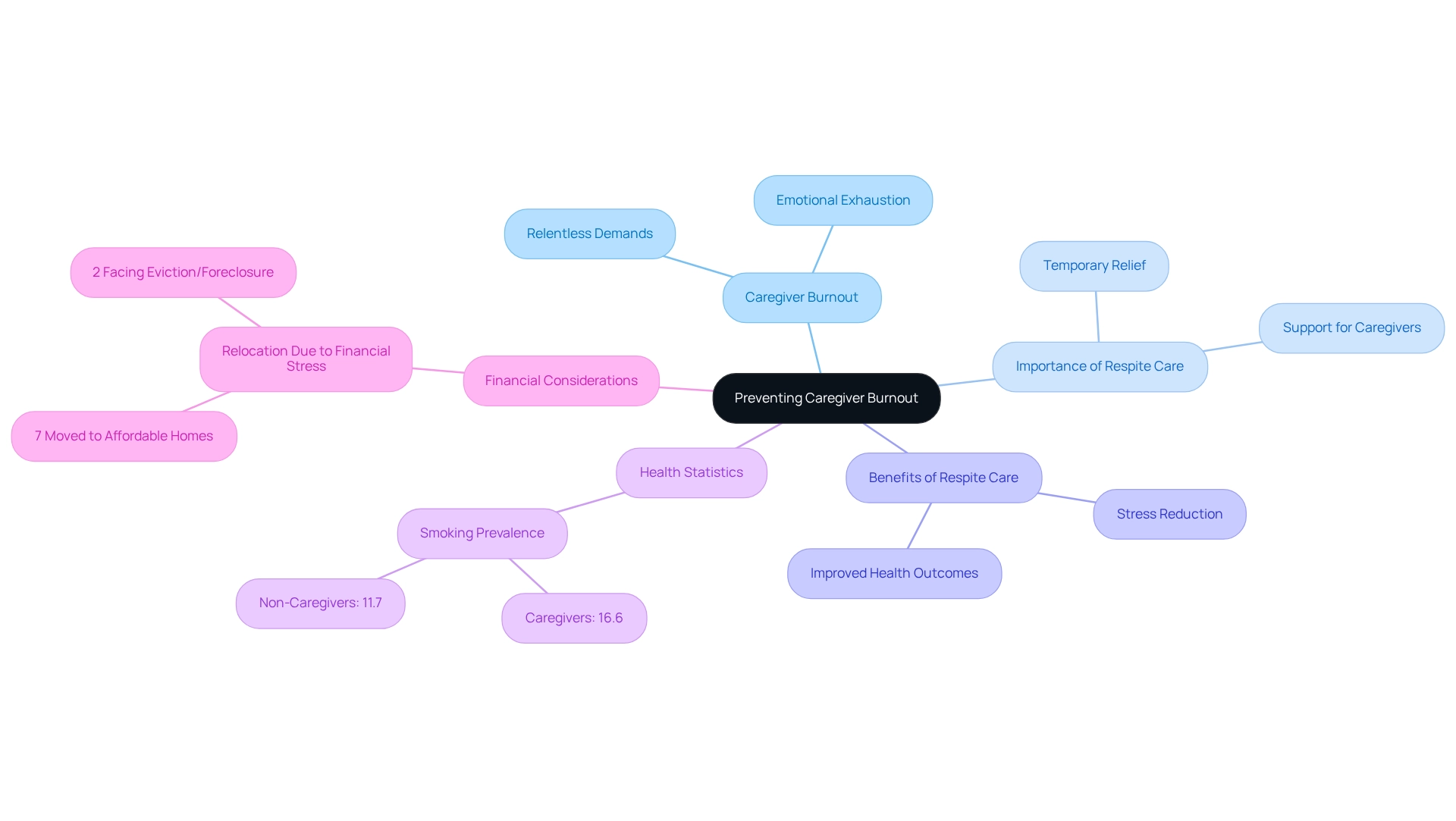Overview
Respite care serves as a temporary support system, thoughtfully designed to offer relief to primary caregivers. This crucial service allows caregivers to take essential breaks, ensuring their loved ones continue to receive the necessary care. It’s important to recognize that respite care not only alleviates caregiver stress and prevents burnout but also significantly enhances the quality of life for both caregivers and recipients. Through structured support options, respite care plays a vital role in maintaining emotional and physical well-being.
Imagine the peace of mind that comes from knowing your loved one is in caring hands while you take a moment for yourself. In addition, respite care provides caregivers with the opportunity to recharge, fostering a healthier environment for everyone involved. By investing in this support, you’re not just alleviating your own stress; you’re also improving the overall experience for your loved one.
We understand how challenging caregiving can be, and that’s why we’re here for you. Our services are designed with compassion and understanding, ensuring that both you and your loved one feel supported. Your comfort is our priority, and we invite you to explore the benefits of respite care. Let’s take this journey together, ensuring that care is always available when you need it most.
Introduction
In a world where caregiving demands can feel overwhelming, respite care emerges as a lifeline for both caregivers and care recipients. This essential service offers temporary relief, allowing caregivers to recharge while ensuring that their loved ones continue to receive the necessary support. With the growing recognition of the emotional and physical toll caregiving can take, understanding the various types of respite care and their benefits becomes crucial.
From in-home options that provide comfort and familiarity to out-of-home services that enhance social engagement, families have choices that cater to their unique needs. As the landscape of caregiving evolves, so too does the importance of advocating for and utilizing respite care services. By doing so, both caregivers and those they care for can enjoy a better quality of life. We’re here for you, and your comfort is our priority.
Understanding Respite Care: Definition and Purpose
What is respite care? It is a form of assistance that includes short-term support options aimed at offering vital relief to primary caregivers, allowing them to take necessary breaks from their responsibilities. This support is especially essential for family members caring for individuals with chronic illnesses, disabilities, or age-related conditions. At Best Care Nurses Registry, we provide tailored temporary support services that are adaptable and customizable, ensuring that both caregivers and recipients receive the assistance they require.
The main goal of temporary support is to enable caregivers to rejuvenate, thus improving their ability to provide ongoing help to their loved ones. Research indicates that family caregivers often face significant emotional and physical strain. Studies reveal that individuals caring for children can forgo earnings averaging $3,200 per child annually due to their responsibilities. By offering organized breaks, supportive services not only ease the strain on caregivers but also ensure that recipients continue to receive essential support during these intervals.
Furthermore, Best Care Nurses Registry assists caregivers in navigating long-term insurance, helping them understand their policies and optimize their benefits. This support is vital for families aiming to use their insurance efficiently while obtaining relief services.
A significant case study exploring differences in temporary support utilization among dementia caregivers highlights the evolving landscape of assistance for those who provide care. Initially, in 2015, Black dementia caregivers showed a notably reduced rate of temporary support usage compared to their White peers. However, by 2017 and 2021, this gap had narrowed, illustrating the growing recognition of the importance of relief support across various communities.
Despite this progress, overall usage remains low, indicating a pressing need for ongoing advocacy and resources to promote relief support services.
Experts in the field emphasize that understanding what respite care is crucial for maintaining the well-being of those providing care. Caregiving experts highlight that the capacity to take breaks can greatly enhance the mental health and overall quality of life for caregivers, enabling them to return to their responsibilities revitalized and better prepared to face the challenges of caregiving. Steven H Zarit, a prominent figure in caregiving research, points out that “reliance on RCTs restricts the range of research that can be conducted in community-based settings, and also limits testing innovative models of change that could lead to more individualized treatment approaches.”
This underscores the necessity for varied evaluation techniques to fully comprehend the needs of caregivers.
Additionally, recent conversations in support networks have emphasized various resources available for caregivers, including the role of temporary relief in managing stress and preventing burnout. A news article from August 7, 2023, discusses tips for seniors and their caregivers, underscoring the importance of utilizing available resources to enhance support for those assisting them.
In summary, relief services serve as an essential resource for family caregivers, providing them with the necessary assistance to uphold their well-being while ensuring that their loved ones receive ongoing attention. By acknowledging and utilizing support resources from Best Care Nurses Registry, caregivers can improve their quality of life and sustain their support efforts over the long term.
Types of Respite Care Services: In-Home and Out-of-Home Options
When considering what respite care entails, it’s essential to understand that these support services primarily fall into two categories: in-home and out-of-home options. Each type is thoughtfully designed to meet the diverse needs of families and their loved ones. In-home respite assistance includes skilled professionals from Best Care Nurses Registry who visit your residence, providing vital support that allows primary caregivers to take a much-needed break for a few hours or even days. This option is often favored for its convenience and the comfort of familiar surroundings, which significantly alleviates stress for both the provider and the care recipient.
With Best Care’s personalized support worker matching, families can feel confident knowing their loved ones are in safe and capable hands. The caregivers we refer are carefully screened and dedicated to excellence, ensuring that your loved one enjoys healthy, meaningful days at home.
On the other hand, out-of-home respite support includes options like adult day programs and temporary accommodations in licensed residential facilities. These settings often provide a more structured environment, which can be particularly beneficial for individuals who thrive on routine. Moreover, out-of-home options typically offer enhanced socialization opportunities, allowing recipients to interact with peers and engage in organized activities, positively impacting their overall well-being.
A case study titled “4330 Out-of-Home Respite Care Services” illustrates the types of services available in licensed facilities, highlighting the significance of these options during short-term caregiver absences.
Current trends indicate a growing preference for in-home support, as families increasingly seek personalized and adaptable solutions. Understanding what respite care is can empower them to uphold their loved ones’ comfort and independence. However, out-of-home temporary assistance remains a vital option, particularly for those requiring more intensive support or supervision. Statistics reveal that although in-home support is often preferred for its familiarity, out-of-home services are crucial for providing comprehensive assistance when primary caregivers are unavailable.
Additionally, families should be aware that permission to exceed the 30-day limit for temporary support requires a written request to the MCO, along with supporting documentation. This is particularly important for those contemplating long-term assistance alternatives.
Both forms of relief services, often referred to as respite care, aim to reduce the strain on primary caregivers, ensuring that individuals receive essential support tailored to their unique situations. Furthermore, under the IHSS program, recipients must hire individual providers to perform approved tasks or may choose from contracted IHSS providers, which is a significant factor for families seeking relief options. It’s also crucial to recognize the risks seniors face without companion services, such as social isolation, which can lead to depression and cognitive decline, as well as safety issues like falls and medication mismanagement.
By understanding the unique benefits of both in-home and out-of-home support, families can make informed choices that best fit their needs and those of their loved ones, ensuring safety and happiness at home. For more information or to schedule a consultation, please contact Best Care Nurses Registry at (888) 203-2529.

Benefits of Respite Care: Enhancing Quality of Life for Caregivers and Recipients
What is respite care? It refers to services that offer numerous advantages, greatly improving the quality of life for both those providing assistance and those receiving it. Respite care provides essential breaks for caregivers, which can reduce stress, lessen the risk of burnout, and enhance overall mental well-being. Research shows that caregivers who utilize relief programs often express feeling revitalized. This raises the important question: what is respite care, and how does it help them manage their duties?
In fact, a study revealed that for every $1,000 spent on relief services, there was an 8% reduction in the likelihood of hospitalization. This underscores the importance of these services in maintaining health and stability. Best Care Nurses Registry, with its extensive experience and strong reputation in South Florida since 1980, exemplifies how effective temporary support can lead to such positive outcomes.
For recipients, understanding what is respite care ensures the continuity of assistance within a familiar environment, which can be both comforting and beneficial for their emotional health. This type of support not only maintains routine but also encourages social interactions, vital for enhancing happiness and overall quality of life. Specialists in psychology highlight that break assistance can lead to better mental health outcomes for caregivers, enabling them to rejuvenate and return to their responsibilities with renewed energy and focus.
Best Care’s customized support and adaptability enhance these advantages, establishing it as a favored option for families seeking temporary relief. Case studies indicate that families who utilize temporary support options observe significant improvements in their loved ones’ emotional health, alongside reduced stress levels among those providing assistance. For example, one family shared that after using Best Care’s temporary care services, their loved one became more involved and joyful, while the caregiver felt less stressed and more supported.
By offering a supportive atmosphere for both parties, relief services exemplifying what is respite care play a vital role in promoting a healthier, more balanced caregiving dynamic. As Karla Soares-Weiser mentions, incorporating short-term support into caregiving practices can greatly improve the overall experience for both caregivers and recipients. With dedicated professionals like Brianna, Lucinda, Sherie, and Jacque at Best Care Nurses Registry, families can trust that their loved ones are in compassionate hands, ensuring safety and happiness at home.
Testimonials from pleased clients further confirm the positive influence of Best Care’s services, emphasizing the peace of mind and relief felt by families who have opted for short-term assistance.
Emotional and Psychological Support: The Role of Respite Care
What is respite care? It serves as an essential support network for those providing care, addressing the emotional and psychological difficulties they frequently encounter. Caregiving responsibilities can lead to significant feelings of isolation, anxiety, and depression. By offering caregivers crucial breaks, respite services exemplify what is respite care, allowing them to engage in self-care, pursue personal interests, or simply relax.
This emotional break is vital for maintaining the caregiver’s mental well-being, which directly impacts their ability to understand what is respite care and provide effective support for their loved ones.
Furthermore, respite services offer recipients the opportunity to experience a different environment and connect with new caregivers, which can greatly enhance their emotional wellness. Recognizing the need for companionship or caregiving assistance is essential; signs such as social isolation, difficulties with daily activities, and safety concerns indicate that a loved one might benefit from additional help. Companion and sitter services can be tailored to meet the specific needs and schedules of individuals, providing flexible options ranging from a few hours a week to full-time care.
Research shows that individuals utilizing respite services—essentially what is respite care—report lower levels of anxiety and depression, highlighting the psychological benefits of these programs. For example, a survey conducted during the COVID-19 pandemic found that caregivers with access to support systems experienced significantly fewer adverse mental health symptoms compared to those without such resources. Notably, parents and unpaid caregivers of adults were five times more likely to experience negative mental health symptoms compared to adults not in these roles, underscoring the critical need for support.
Integrating insights from mental health experts, it is evident that personalized emotional support is crucial for caregivers, especially those juggling multiple responsibilities. As Mark É. Czeisler noted, “Parents and unpaid supporters of adults, particularly those in both roles, may benefit from mental health assistance and services tailored to their responsibilities.” The emotional advantages of respite support not only improve the quality of life for caregivers but also foster a healthier environment for providing care, ultimately benefiting both parties involved.
This is further illustrated by the case study titled “Mental Health Challenges Among Parents and Caregivers During COVID-19,” which highlights the significant mental health challenges faced by caregivers and the positive impact of support systems. By choosing Best Care Nurses Registry, families can ensure that their loved ones receive the compassionate and flexible support they need, enhancing both independence and quality of life.

Preventing Caregiver Burnout: How Respite Care Offers Relief
Caregiver burnout is a pressing issue that often arises from the relentless demands of caregiving, leaving little room for rest. Understanding what respite care is reveals it as a vital solution to alleviate this burnout. By offering support for those caring for others, respite care allows them to temporarily step away from their responsibilities, rejuvenating both physically and emotionally.
Studies show that individuals participating in respite programs experience notably reduced stress levels and enhanced overall health. For instance, research indicates that caregivers utilizing these services report a significant decrease in feelings of stress and exhaustion. Additionally, data reveals that 16.6% of caregivers smoke, compared to 11.7% of those not in caregiving roles, highlighting the health issues related to stress faced by caregivers.
Financial burdens further contribute to burnout among caregivers, as reports indicate that 7% have relocated to more affordable homes due to financial stress. This underscores the importance of respite care as a crucial support measure.
At Best Care Nurses Registry, we recognize the challenges faced by family supporters. Our customized home health assistance solutions are designed to alleviate stress and ensure the safety of seniors. With our meticulously vetted support providers, you can breathe easier knowing your loved one is in skilled hands.
This proactive approach not only supports caregivers but also enhances the quality of care provided to those they assist. When caregivers return to their roles revitalized, they are better equipped to offer empathetic and efficient support. Furthermore, healthcare professionals, including Zarit and colleagues, emphasize the significance of breaks, particularly what respite care offers, in addressing the negative impacts of caregiving on emotional, social, financial, physical, and spiritual well-being.
By prioritizing relief support through Best Care Nurses Registry, families can foster a healthier environment for caregivers, ultimately leading to better outcomes for both caregivers and their loved ones. Moreover, a thorough literature review on caregiver burden has established a framework for assessing the challenges faced by caregivers, highlighting the necessity for effective relief options. Call (888) 203-2529 to get started and ensure your loved one’s safety and happiness while allowing yourself the time to reconnect with family and manage your responsibilities.

Navigating Costs: Understanding the Financial Aspects of Respite Care
Understanding the costs associated with temporary support is crucial for families exploring these important options. The expense of temporary assistance can vary significantly based on several factors, including location, type of support, and duration of service. For instance, in-home assistance typically ranges from $15 to $40 per hour, while out-of-home services, such as adult day programs, may cost between $25 and $150 per day.
This variability highlights the importance of examining local options to find the best fit for individual needs.
In 2025, families can access various financial aid programs designed to alleviate the costs of short-term support. Medicaid often provides coverage for eligible individuals, while long-term insurance policies might include respite support benefits. At Best Care Nurses Registry, we accept most long-term support insurances directly on your behalf, enabling you to direct the provider to pay us through an Assignment of Benefits (AOB).
This means you can begin receiving assistance right away, often without any upfront costs, unless your policy has an elimination period. Additionally, local relief assistance grants can offer financial support tailored to specific community needs. For example, our services focus on daily living tasks such as bathing, grooming, and companionship, which are typically not covered by Medicare.
We encourage families to thoroughly explore all available funding options to ease the financial burden of temporary support. Many families have successfully utilized financial assistance programs to cover costs, allowing them to prioritize their loved ones’ well-being without the added stress of financial concerns. Notably, one in three adults aged 50-80 report feeling isolated at times, underscoring the importance of emotional support in home assistance.
By understanding the financial landscape of short-term assistance services, families can make informed decisions that best suit their circumstances, ensuring they receive the personalized support they need from Best Care Nurses Registry.
Finding the Right Respite Care: Tips for Families
Locating the appropriate relief assistance can be a daunting journey for families. However, with a methodical strategy, it can become more manageable. Here are essential tips to guide you through this process:
- Assess Your Needs: Begin by recognizing the specific support requirements of your loved one. Consider their medical needs, daily routines, and personal preferences to determine the type of support that would best suit them.
- Research Providers: Seek reliable short-term care agencies or independent support workers in your vicinity. Utilize online resources, check reviews, and seek recommendations from other families who have navigated similar situations. This step is crucial, as nearly 76% of caregivers in critical need have reported that understanding respite care greatly aided them in managing personal time and household duties.
- Interview Potential Providers: Conduct thorough interviews with potential caregivers or agencies. Assess their experience, qualifications, and compatibility with your loved one. At Best Care Nurses Registry, our devoted team, including skilled experts like Brianna and Sherie, is committed to providing personalized support that meets the unique needs of each client. This interaction is vital, as it helps build trust and comfort, essential for effective support.
- Discuss Costs and Payment Options: Be transparent about the financial aspects of respite services. At Best Care Nurses Registry, we accept various payment options, including long-term support insurance, private pay, and VA benefits, making it easier for families to find a solution that fits their budget. It’s important to note that 47% of working caregivers have reported that increased caregiving expenses have depleted their savings, with average out-of-pocket costs reaching $5,531 annually. This financial burden underscores the significance of understanding respite care and locating a support solution that suits your budget.
- Comprehend Our Offerings: Best Care Nurses Registry provides a variety of services customized to address the requirements of seniors, including personal assistance, companionship, and skilled nursing services. Understanding respite care can assist families in selecting the appropriate level of support for their loved ones.
- Trust Your Instincts: Ultimately, choose a provider that feels right for your family. Ensure that both you and your loved one feel comfortable and secure with the chosen caregiver. Remember, the objective is to find a relief service solution that reduces stress and enhances the quality of life for all involved.
By adhering to these steps, families can effectively manage the intricacies of choosing temporary assistance. Understanding respite care ensures that loved ones receive the compassionate and tailored support they deserve. Moreover, it’s noteworthy that about 40% of those providing support who assessed their health as fair or poor prior to relief assistance now evaluate their health as good, emphasizing the positive effect of relief services on the well-being of those who assist. According to the Corporation for National and Community Service, “Approximately 40% of individuals who assessed their health as fair or poor prior to receiving support now evaluate their health as good.”
This reinforces the importance of understanding respite care, as it benefits not only the loved one but also the caregiver’s health.
Conclusion
Respite care stands out as a vital resource for both caregivers and care recipients, providing essential support that truly enhances overall quality of life. By offering temporary relief to caregivers, respite services allow them to recharge and alleviate the emotional and physical strains associated with their responsibilities. The flexibility of in-home and out-of-home options ensures that families can choose the type of care that best fits their unique needs, whether it be the comfort of familiar surroundings or the structured environment of a care facility.
The benefits of respite care extend beyond just the caregivers; care recipients also experience improved emotional well-being through continued support and social engagement. Research underscores that utilizing respite services can lead to significant reductions in caregiver stress, with studies revealing improved mental health outcomes for those who take advantage of these services. This symbiotic relationship fosters a healthier caregiving dynamic, ensuring that both parties thrive.
As the landscape of caregiving continues to evolve, understanding the financial aspects and available resources for respite care becomes increasingly important. Families are encouraged to explore various funding options, including Medicaid and long-term care insurance, to alleviate the financial burden associated with these essential services. By prioritizing respite care, families can ensure their loved ones receive the compassionate support they need while also safeguarding their own well-being.
Ultimately, embracing respite care is not just about finding temporary relief; it is about fostering a sustainable caregiving environment that prioritizes the health and happiness of both caregivers and their loved ones. By advocating for and utilizing these invaluable services, families can enhance their quality of life, ensuring a more balanced and fulfilling caregiving experience for everyone involved.
Frequently Asked Questions
What is respite care?
Respite care is a form of assistance that provides short-term support to primary caregivers, allowing them to take necessary breaks from their responsibilities. It is particularly important for family members caring for individuals with chronic illnesses, disabilities, or age-related conditions.
What are the main goals of respite care?
The main goal of respite care is to enable caregivers to rejuvenate, improving their ability to provide ongoing support to their loved ones. It also aims to ease the emotional and physical strain that caregivers often face.
What types of respite care services are available?
Respite care services primarily fall into two categories: in-home and out-of-home options. In-home respite assistance involves skilled professionals visiting the caregiver’s residence, while out-of-home support includes adult day programs and temporary accommodations in licensed residential facilities.
How does Best Care Nurses Registry assist caregivers?
Best Care Nurses Registry provides tailored temporary support services, helping caregivers navigate long-term insurance and understand their policies. They also match families with screened and dedicated caregivers to ensure quality support.
What are the benefits of in-home respite care?
In-home respite care offers convenience and comfort, allowing caregivers to take breaks while their loved ones receive care in familiar surroundings. This option significantly alleviates stress for both caregivers and recipients.
What are the benefits of out-of-home respite care?
Out-of-home respite care provides a structured environment, which can be beneficial for individuals who thrive on routine. It also offers enhanced socialization opportunities and organized activities, positively impacting the overall well-being of recipients.
Why is understanding respite care important for caregivers?
Understanding respite care is crucial for maintaining the well-being of caregivers. The ability to take breaks can enhance their mental health and overall quality of life, allowing them to return to caregiving revitalized.
What challenges do caregivers face regarding respite care?
Despite the progress in recognizing the importance of respite care, overall usage remains low, indicating a need for ongoing advocacy and resources to promote these services.
How can families request extended respite care beyond the standard limits?
Families wishing to exceed the 30-day limit for temporary support must submit a written request to the Managed Care Organization (MCO), along with supporting documentation.
What risks do seniors face without companion services?
Without companion services, seniors may experience social isolation, which can lead to depression and cognitive decline, as well as safety issues such as falls and medication mismanagement.











